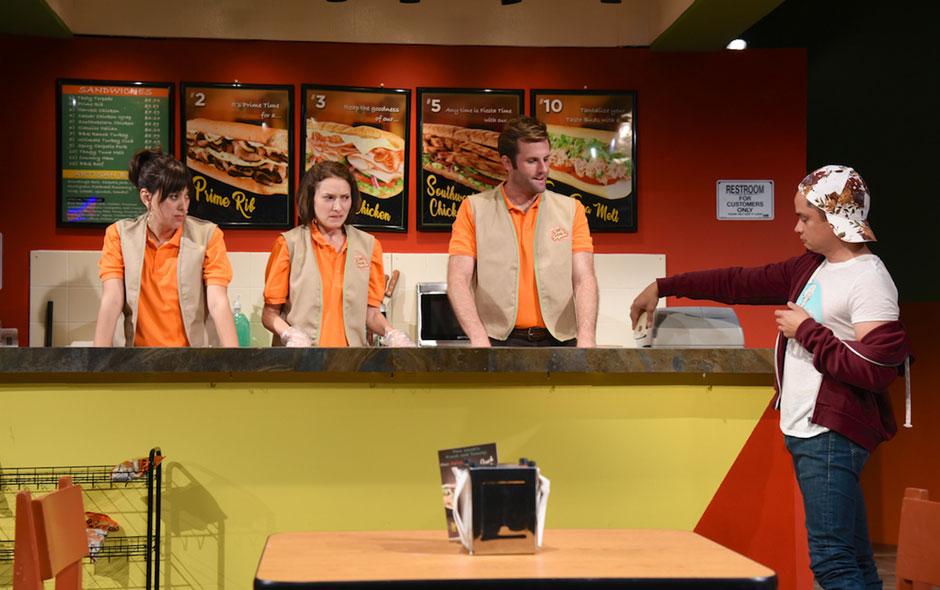
PASADENA—The evil fast-food corporation has a thick looseleaf notebook detailing how to make sandwich makers’ lives as miserable as possible, and the top leadership super-sized wealthy.
Hilarity ensues.
It would be straightforward enough to research a thorough exposé of the fast-food world—the enormous profits, the questionable business practices, the crappy way workers are treated, the unwholesome product, and the gray legal fog into which corporate magnates retreat when they try to absolve themselves from responsibility and try to blame slave wages and abusive working conditions on the franchise owners.
Playwright Bess Wohl has taken a different approach in this West Coast premiere production by IAMA Theatre. Her 90-minute, no intermission romp through the opening (and closing) weeks of a new Tasty Torpedo outlet in some unnamed all-American mall will tell you just about all you need to know.
Of course, you already know quite a bit: How fast-food workers, even without a union, have stood at the forefront of the demand for a $15 “living wage,” have revealed numerous incidents of sexual harassment on the job, have exposed unsafe conditions at work, have shown how punishing precarious “flex-time” jobs (for the bosses’ benefit, not the workers’) can be. They’ve also demolished that familiar corporate trope that fast-food workers are mostly just entry-level student employees trying to pick up a few extra bucks to pay for textbooks and tuition. It turns out (who knew!!??) that hundreds of thousands of fast-food workers are actually trying to—forced to might be the better term—make their living from these undervalued occupations.
American Hero has every bit the double meaning the author intended. We all have witnessed the assembly-line manufacture of submarine sandwiches: Worker 1 selects the bread you’ve chosen, spreads it open and gives it a mayo or honey mustard shmear. Worker 2 selects the prepared meat and the add-ons you want, and passes it to Worker 3, who wraps it and maybe also rings you out. But Wohl shows how scientifically organized the Fordist process is: In an early scene showing the training of the new workforce getting ready for the grand opening of this latest Tasty Torpedo factory, the words they have to say are standardized, the quantity of ingredients is very specific, and above all, the sandwich must be crafted in 20 seconds or less. That’s if you don’t want your bread toasted.
Problem is, the new franchise owner, Bob (Rodney To, but on opening night, Sept. 21, his very capable understudy Nick Bonanno filled in) disappears as soon as the shop opens for business. So the sex-bomb Jamie (Anna LaMadrid), the timid, mousy Sheri (Laura Mann) and the ex-Bank of America officer and holder of an MBA Ted (Graham Outerbridge) have to run the place unsupervised. Supplies start running out, frustrated customers arrive (the Bob actor covers all these smaller roles) and can’t order what’s on the menu, and personal tensions erupt among the crew as, gradually, their individual backstories emerge. None of them, needless to say, is working there because they’d always dreamed of a career slapping sandwiches into shape for minimum wage. As Jamie says of her own experience with work and men, “Life is a shit parade.”
The play is clearly about more than sandwiches. As the director James Eckhouse explains in his program note, “deeper into the work we discover currents running through that reflect many of the challenges we face in our modern world: How do we maintain our individuality in a soul-less corporate work space? Does religion have a place in a ‘Waiting for Godot’ universe? How can the feminine thrive in male-centric capitalistic society? How do we nourish our inner artist in the cauldron of empty-caloried mass-produced culture?”
If American Hero, which dates back to 2013, is a dark comic look at the struggles of the American working class, it is no less empathetic with the immigrant shnook, presumably from some Middle Eastern or Asian subcontinental country, who put together a consortium of lenders to buy the $450,000 franchise, expecting the store to become a model of making a windfall in America. Wohl deftly unspools how Tasty Tornado rigs the game against the franchisees themselves by restricting their right, for example, to buy supplies from any other than designated sources at higher prices, a cut of which goes back to the corporation, and by, in this case, situating this new outlet only three minutes away from another franchise in a more trafficked area.
The playwright derived part of her inspiration for the play from the 2005 suicide of Bhupinder “Bob” Baber, a Quiznos franchisee. Baber left a note saying, “Quiznos has killed me. Destroyed my life. Destroyed my family life for the past seven years. It has been a harrowing experience. We just could not get out of it. All doors were shut. Can someone stop this?”
“[T]he franchise system,” writes Luan Schooler, “itself is inherently lopsided: individual franchisees have all the responsibility and no authority; the corporate franchisors have all be authority and no responsibility. Corporate gets to make all the decisions, whether they have the slightest clue what’s going on—or not.” Another way to view it is like a Ponzi scheme, in which Tasty Torpedo keeps the franchise fee, but the low achievers at the bottom fall into debt as their stores fail.
Revealingly, it turns out that the MBA now down on his luck is the least resourceful in dealing with the sudden turn of events which obliges the trio of workers to self-manage in the absence of an overseer. In the end, Wohl suggests (I don’t want to give away too much), the workers themselves have far greater agency with respect to what needs to be done than the impersonal, anonymous corporation that has no familiarity with the actual situation on the ground. Each of them responds heroically in their own way. Who needs the bosses anyway?
The Great Recession may be over, and more Americans are working. But if you lost your union manufacturing job, you’re not likely to regain another one with comparable pay and benefits. Sandwich artistry may be your future, and American Hero is a chilling microcosm of it. As Ted asks, “What kind of world is it where people just take?”
In the meantime, check out a few of these fast-food CEO hourly wages, cited by Luan Schooler and sourced in Max Krantz’s article, “Maximum Wage! How much CEOs Earn an Hour” (USA Today, April 6, 2015). That was three years ago; they’re probably higher now:
Chipotle co-CEO Montgomery Moran: $13,489.
Chipotle co-CEO Steven Ellis: $13,471.
Starbucks CEO Howard Schultz: $10,285.
And at the lower end of the scale:
Domino’s CEO Patrick Doyle: $3,571, and
Panera Bread CEO Ronald Shaich: $1,292.
An hour! As soon as they’ve made $128,400 (that would be in 9.5 hours for Mr. Moran), they’ve capped off their Social Security contributions for the year.
And then less than full-time federal minimum wage workers there at $7.25 an hour turn around and apply for food stamps, public housing, publicly subsidized healthcare and other benefits which come out of American taxpayers’ pockets. Republicans just passed a massive tax giveaway and now they seek to cut back on Medicare, Medicaid and Social Security. Just who is the recipient of “welfare” in America?
Working-class families and themes are found on TV most seasons, and often in film. Now, it seems, they are appearing more frequently on the stage, where writers are digging deep into the economic system to see how capitalism affects the poor and disenfranchised. Recent examples of new plays and revivals have included Sweat, My Mañana Comes, Gloria, The Hairy Ape, Miss Lulu Bett, Native Son, The Grapes of Wrath, Paradise, Mexican Day, and many more. It is a welcome refocusing of our artists’ attention: Somehow frivolous, escapist romantic comedies or costume dramas just don’t seem like a responsible use of our talents in these deeply challenging times.
The perfect stage set by Justin Huen puts you right inside the Tasty Torpedo. Melissa Tin did the costumes, and Josh Epstein the lighting design. If you appreciate socially conscious theatre, try not to miss this one.
American Hero continues through Oct. 21 on Fri. and Sat. at 8 pm and Sun. at 7 pm. The IAMA Theatre is guest producing the play at the Carrie Hamilton Theatre at the Pasadena Playhouse, 39 S. El Molino Ave., Pasadena 91101. For tickets, call (323) 380-8843 or go to iamatheatre.com.












Comments